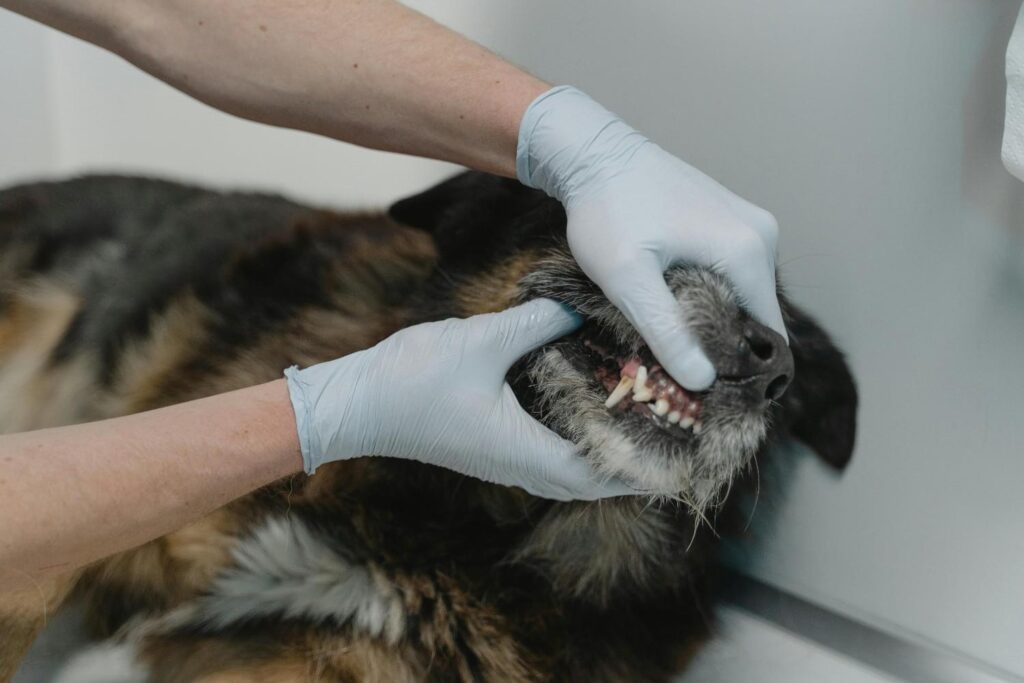Why Pet Dental Care Matters More Than You Think
Table of Contents
Dental care isn’t just about keeping your pet’s teeth clean or their breath smelling fresh. It’s an essential part of their overall health and happiness. Many pet owners underestimate the importance of dental hygiene until problems like bad breath, difficulty eating or gum inflammation arise. Yet, what happens in your pet’s mouth can significantly affect the rest of their body, from their heart to their kidneys.
Good oral care is not a luxury; it’s a necessity. With the right knowledge and consistent habits, you can help reduce the risk of dental issues and support your furry companion’s long-term health.
Why Pet Dental Health Is So Important
Just like humans, pets accumulate plaque and tartar on their teeth. When not removed, this sticky film becomes a breeding ground for bacteria that attack the gums and tooth roots. Over time, it can lead to periodontal disease, which damages the supporting structures of the teeth.
What’s more concerning is that bacteria from the mouth can enter the bloodstream and travel to other organs, such as the heart, liver, and kidneys. This process, called bacteraemia, can contribute to serious systemic infections and chronic illness.
Pet dental health doesn’t develop overnight, as it’s a progressive condition that quietly causes pain and discomfort long before visible symptoms appear. Reducing the risk of dental disease through regular care is far easier, cheaper, and kinder than treating it later on.
Common Dental Problems in Cats and Dogs
Some of the most frequent dental issues vets see include:
- Gingivitis – Inflammation of the gums, often the first sign of dental disease.
- Tartar build-up – Hard deposits on teeth that irritate gums and harbour bacteria.
- Periodontal disease – Infection beneath the gumline that can cause tooth loss.
- Tooth fractures – Common in pets that chew on hard toys or bones.
- Retained baby teeth – Especially in small dogs, which can cause overcrowding.
- Stomatitis (cats) – A painful inflammation that affects the entire mouth.
Even mild dental issues can progress quickly without intervention. Catching them early ensures your pet doesn’t suffer silently.
How to Recognise Dental Disease Early
Dental issues often go unnoticed because pets are experts at hiding pain. However, observant owners can spot subtle changes that indicate oral trouble. Look out for:
- Persistent bad breath (halitosis).
- Yellow or brown tartar on teeth.
- Red, swollen or bleeding gums.
- Drooling more than usual.
- Reluctance to eat, dropping food or chewing on one side.
- Pawing at the mouth or rubbing the face.
- Behavioural changes, such as irritability or reduced playfulness.
If any of these signs appear, schedule a dental check immediately. Early treatment not only prevents pain but also stops the disease from affecting other organs.
What Happens During a Professional Dental Cleaning

A professional veterinary dental cleaning is much more thorough than any home routine. Here’s what you can expect at our veterinary hospital:
- Examination and Pre-Anaesthetic Checks
Your vet will perform a physical exam and may recommend blood tests to ensure your pet is healthy enough for anaesthesia.
- Anaesthetic and Monitoring
Anaesthesia keeps your pet calm, pain-free and still while allowing the vet to clean beneath the gumline safely. Advanced monitoring equipment ensures their safety throughout the procedure.
- Scaling and Polishing
Using specialised instruments, the vet removes plaque and tartar both above and below the gumline. Teeth are then polished to smooth the surface and slow future build-up.
- Dental X-rays and Extractions
If necessary, dental radiographs are taken to assess root health. Damaged or loose teeth may need extraction to prevent ongoing pain and infection.
- Post-Cleaning Care and Recovery
Once your pet wakes, your vet provides aftercare instructions, including pain management, diet adjustments and home brushing tips.
This comprehensive approach supports not just a cleaner mouth but overall health.
Is Anaesthesia Safe for Dental Procedures?
Many owners worry about anaesthesia, especially for older pets. Modern veterinary anaesthesia is considered very safe when properly monitored and tailored to your pet’s needs. Your vet will evaluate your pet’s age, breed, and health before the procedure to minimise risk.
Anaesthesia-free cleanings may sound appealing, but they only remove surface tartar and cannot clean under the gumline, where most disease hides. These “cosmetic cleanings” can give a false sense of security and delay real treatment.
How Often Should Pets Have Dental Checks?
In general, pets should have a professional dental check once a year, often as part of their annual wellness exam. However, some pets may need more frequent visits, especially:
- Small dog breeds like Chihuahuas, Poodles and Shih Tzus.
- Older pets with pre-existing health issues.
- Cats are prone to gingivitis or stomatitis.
Regular check-ups help catch problems before they become painful or costly to treat.
Home Pet Dental Care: Your Role as an Owner
Your pet’s dental health begins at home. Consistency is key. Here’s how to build a good routine:
- Brush daily using pet-safe toothpaste and a soft brush. Start gradually and reward your pet after every session.
- Dental chews and toys can help reduce plaque, but should never replace brushing. Choose products approved by veterinary associations, especially for dog dental care.
- Water additives and oral gels can complement brushing, but consult your vet first.
- Regular inspections – Gently lift your pet’s lips to check for redness, bad odour or build-up.
Even if you can’t brush daily, every effort helps slow plaque accumulation and maintain oral comfort.
Practical Pet Dental Care Schedule
Daily: Brush your pet’s teeth or use a vet-approved dental wipe.
Weekly: Inspect gums and teeth for changes; offer safe chew toys.
Monthly: Check for odour or discolouration and note changes in eating habits.
Annually: Book a dental check-up and cleaning at your vet.
Consistency ensures problems are caught early and your pet stays healthy throughout their life.
Final Thoughts
Your pet’s mouth is a window into their overall health. Ignoring dental care can lead to chronic pain, infections and even life-threatening organ problems. Fortunately, with regular home care and professional veterinary attention, many dental issues can be minimised or avoided.Start today by checking your pet’s mouth, brushing regularly, and scheduling a dental check-up at Starlight Veterinary Hospital. A healthy mouth contributes to a happier, healthier life, and that’s something every pet deserves. Contact us today!
Frequently Asked Questions
Can I use human toothpaste on my pet?
No. Human toothpaste contains fluoride and xylitol, which are toxic to animals. Always use vet-approved toothpaste designed for pets.
Are dental chews enough to clean my pet’s teeth?
Dental chews help reduce plaque, but cannot replace brushing or professional cleaning. Use them as a supplement, not a substitute.
What if my pet refuses tooth brushing?
Start slowly and be patient. Try finger brushes or gauze pads at first. Your vet can recommend alternatives like dental gels or wipes.
Is dental disease really dangerous for pets?
Yes. Untreated dental infections can spread bacteria to the heart, kidneys and liver, causing serious long-term illness.
Disclaimer: The information provided on this page is for general educational purposes and should not replace professional veterinary advice. Always consult a licensed veterinarian for diagnosis and treatment recommendations tailored to your pet’s specific health needs.

Dr. Hank has always shown a deep passion for animal health and a strong belief in responsible pet ownership. As both a veterinarian and a long-time pet parent to dogs and cats (now all in their geriatric years), he brings practical knowledge and compassion to supporting pets in their later life stages.
Before joining Starlight, Dr. Hank spent 12 years in the pet food industry. He held key roles in national veterinary sales and B2B marketing at Royal Canin, and later led veterinary channel development and served as a lead trainer at MARS Petcare Malaysia. In these roles, he was instrumental in delivering pet nutrition education to a wide range of industry stakeholders.






